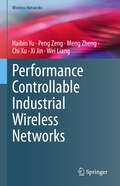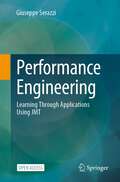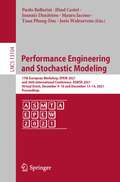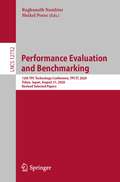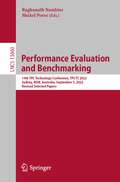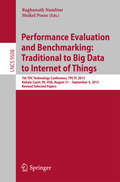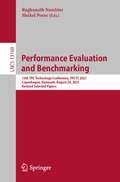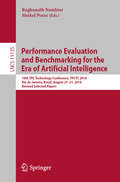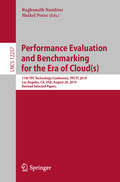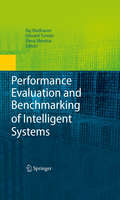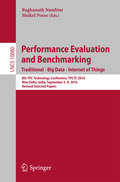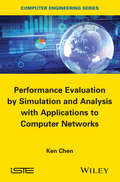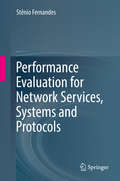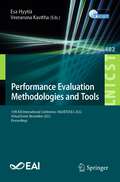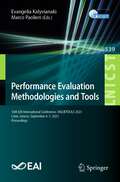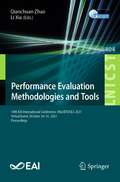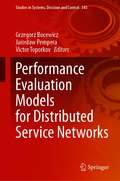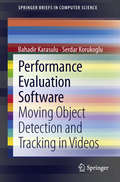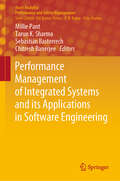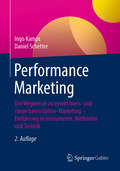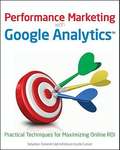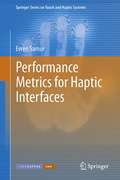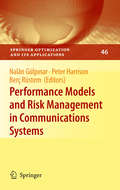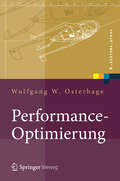- Table View
- List View
Performance Controllable Industrial Wireless Networks (Wireless Networks)
by Haibin Yu Peng Zeng Meng Zheng Chi Xu Xi Jin Wei LiangWith the rapid proliferation of information and communications technology, industrial automation has undergone a sweeping transformation toward intelligent manufacturing. Wireless communication is widely considered to be one of the key technologies enabling intelligent manufacturing. On one hand, deterministic communication with high reliability and low latency is typically required in industrial automation applications. On the other hand, wireless communication in industrial settings is hindered by strictly limited communication resources and many other factors which mainly derive from the shared and error-prone nature of the wireless channels used. The limited communication resources and harsh channel conditions pose considerable challenges for reliable, real-time data transmission in industrial wireless networks. Resource optimization methods are vital to ensuring the deterministic performance of industrial wireless networks. Traditional resource optimization methods adopt the isolated resource optimization methods for each protocol layer, which is inherently local-optimal and leads performance uncontrollable. To focus on “Performance Controllable Industrial Wireless Networks”, this book presents thejoint resource optimization methods across multiple protocol layers for industrial wireless networks; reviews recent, major advances; and discusses the practical implementations of the proposed methods. The joint resource optimization methods discussed here will greatly benefit scientists and researchers in the areas of industrial automation and Industrial Internet of Things. To gain the most from this book, readers should have a fundamental grasp of wireless communication, scheduling theory, and convex optimization.
Performance Engineering: Learning Through Applications Using JMT
by Giuseppe SerazziThis open access book improves the users' skills needed to implement models for performance evaluation of digital infrastructures. Building a model is usually a relatively easy task, but making it an accurate representation of the phenomenon to be reproduced is a completely different matter. It is well-known that to increase the ability to build reliable models it is necessary to accumulate experience. The book addresses this need by presenting a collection of case studies of increasing complexity. Readers are introduced to the modeling process gradually, learning the basic concepts step-by-step as they go through the case studies. Queueing Networks are used to design the models solved with simulation and analytical techniques from the open source Java Modelling Tools (JMT). Among the models analyzed there are systems for optimizing performance, identifying bottlenecks, evaluating the impact of the variability of traffic and service demands, analyzing the effects of synchronization policies in parallel computing. Four case studies derived from real-life scenarios are also presented: a surveillance system, autoscaling load fluctuations, web app workflow simulation, and crowd computing platform. This book serves as a reference tool for graduate and senior-level computer science students in courses of performance evaluation and modeling, as well as for researchers and practitioners.
Performance Engineering and Stochastic Modeling: 17th European Workshop, EPEW 2021, and 26th International Conference, ASMTA 2021, Virtual Event, December 9–10 and December 13–14, 2021, Proceedings (Lecture Notes in Computer Science #13104)
by Paolo Ballarini Hind Castel Ioannis Dimitriou Mauro Iacono Tuan Phung-Duc Joris WalraevensThis book constitutes the refereed proceedings of the 17th European Workshop on Computer Performance Engineering, EPEW 2021, and the 26th International Conference, on Analytical and Stochastic Modelling Techniques and Applications, ASMTA 2021, held in December 2021. The conference was held virtually due to COVID 19 pandemic. The 29 papers presented in this volume were carefully reviewed and selected from 39 submissions. The papers presented at the workshop reflect the diversity of modern performance evaluation, with topics ranging from modeling and analysis of network/control protocols and high performance/big data information systems, analysis of scheduling, blockchain technology, analytical modeling and simulation of computer and network systems.
Performance Evaluation and Benchmarking: 12th TPC Technology Conference, TPCTC 2020, Tokyo, Japan, August 31, 2020, Revised Selected Papers (Lecture Notes in Computer Science #12752)
by Raghunath Nambiar Meikel PoessThis book constitutes the refereed post-conference proceedings of the 12th TPC Technology Conference on Performance Evaluation and Benchmarking, TPCTC 2020, held in August 2020.The 8 papers presented were carefully reviewed and cover the following topics: testing ACID compliance in the LDBC social network benchmark; experimental performance evaluation of stream processing engines made easy; revisiting issues in benchmarking metric selection; performance evaluation for digital transformation; experimental comparison of relational and NoSQL document systems; a framework for supporting repetition and evaluation in the process of cloud-based DBMS performance benchmarking; benchmarking AI inference; a domain independent benchmark evolution model for the transaction processing performance council.
Performance Evaluation and Benchmarking: 14th TPC Technology Conference, TPCTC 2022, Sydney, NSW, Australia, September 5, 2022, Revised Selected Papers (Lecture Notes in Computer Science #13860)
by Raghunath Nambiar Meikel PoessThis book constitutes the refereed post-conference proceedings the 14th TPC Technology Conference on Performance Evaluation and Benchmarking, TPCTC 2022, which was held in Sydney, NSW, Australia, on September 5, 2022.The 5 revised full papers presented were carefully selected from 12 submissions. The conference focuses on Pick and Mix Isolation Levels; Benchmarking considerations for Trustworthy and Responsible AI (Panel); Preliminary Scaling Characterization with TPCx-AI and New Initiatives.
Performance Evaluation and Benchmarking: Traditional to Big Data to Internet of Things
by Meikel Poess Raghunath NambiarThis book constitutes the thoroughly refereedpost-conference proceedings of the 7th TPC Technology Conference on PerformanceEvaluation and Benchmarking, TPSTC 2015, held in conjunction with the 40thInternational Conference on Very Large Databases (VLDB 2015) in Kohala Coast,Hawaii, USA, in August/September 2015. The 8 papers presented together with 1 keynote,and 1 vision paper were carefully reviewed and selected from 24 submissions. Many buyers use TPC benchmark results as points of comparison when purchasingnew computing systems. The information technology landscape is evolving at arapid pace, challenging industry experts and researchers to develop innovativetechniques for evaluation, measurement and characterization of complex systems. The TPC remains committed to developing new benchmark standards to keep pace,and one vehicle for achieving this objective is the sponsorship of theTechnology Conference on Performance Evaluation and Benchmarking (TPCTC).
Performance Evaluation and Benchmarking: 13th TPC Technology Conference, TPCTC 2021, Copenhagen, Denmark, August 20, 2021, Revised Selected Papers (Lecture Notes in Computer Science #13169)
by Meikel Poess Raghunath NambiarThis book constitutes the refereed post-conference proceedings of the 13th TPC Technology Conference on Performance Evaluation and Benchmarking, TPCTC 2021, held in August 2021. The 9 papers presented were carefully reviewed and selected from numerous submissions. The TPC encourages researchers and industry experts to present and debate novel ideas and methodologies in performance evaluation, measurement, and characterization.
Performance Evaluation and Benchmarking for the Era of Artificial Intelligence: 10th TPC Technology Conference, TPCTC 2018, Rio de Janeiro, Brazil, August 27–31, 2018, Revised Selected Papers (Lecture Notes in Computer Science #11135)
by Raghunath Nambiar Meikel PoessThis book constitutes the thoroughly refereed post-conference proceedings of the 10th TPC Technology Conference on Performance Evaluation and Benchmarking, TPCTC 2018, held in conjunction with the 44th International Conference on Very Large Databases (VLDB 2018) in August 2018.The 10 papers presented were carefully reviewed and selected from numerous submissions.The TPC encourages researchers and industry experts to present and debate novel ideas and methodologies in performance evaluation, measurement, and characterization.
Performance Evaluation and Benchmarking for the Era of Cloud: 11th TPC Technology Conference, TPCTC 2019, Los Angeles, CA, USA, August 26, 2019, Revised Selected Papers (Lecture Notes in Computer Science #12257)
by Raghunath Nambiar Meikel PoessThis book constitutes the refereed post-conference proceedings of the 11th TPC Technology Conference on Performance Evaluation and Benchmarking, TPCTC 2019, held in conjunction with the 45th International Conference on Very Large Databases (VLDB 2019) in August 2019.The 11 papers presented were carefully reviewed and focus on topics such as blockchain; big data and analytics; complex event processing; database Optimizations; data Integration; disaster tolerance and recovery; artificial Intelligence; emerging storage technologies (NVMe, 3D XPoint Memory etc.); hybrid workloads; energy and space efficiency; in-memory databases; internet of things; virtualization; enhancements to TPC workloads; lessons learned in practice using TPC workloads; collection and interpretation of performance data in public cloud environments.
Performance Evaluation and Benchmarking of Intelligent Systems
by Raj Madhavan Elena Messina Edward TunstelThis contributed volume is dedicated to the subject of performance evaluation and benchmarking of intelligent systems by drawing from the experiences and insights of experts gained both through theoretical development and practical implementation of intelligent systems in a variety of application domains. The chapters cover a range of applications, such as assistive robotics, planetary surveying, urban search and rescue, and line tracking for automotive assembly. Subsystems include human-robot interaction, multi-robot coordination, communications, perception, and mapping, Chapters also cover simulation support and open source software for cognitive platforms, providing examples of enabling underlying technologies that can help intelligent systems to propagate and increase in capabilities. Performance Evaluation and Benchmarking of Intelligent Systems serves as a professional reference for researchers and practitioners in a variety of fields.
Performance Evaluation and Benchmarking. Traditional - Big Data - Internet of Things
by Raghunath Nambiar Meikel PoessThis book constitutes the thoroughly refereed post-conference proceedings of the 8th TPC Technology Conference, on Performance Evaluation and Benchmarking, TPCTC 2016, held in conjunction with the 41st International Conference on Very Large Databases (VLDB 2016) in New Delhi, India, in September 2016. The 9 papers presented were carefully reviewed and selected from 20 submissions. They reflect the rapid pace at which industry experts and researchers develop innovative techniques for evaluation, measurement and characterization of complex systems.
Performance Evaluation by Simulation and Analysis with Applications to Computer Networks
by Ken ChenThis book is devoted to the most used methodologies for performance evaluation: simulation using specialized software and mathematical modeling. An important part is dedicated to the simulation, particularly in its theoretical framework and the precautions to be taken in the implementation of the experimental procedure. These principles are illustrated by concrete examples achieved through operational simulation languages (OMNeT ++, OPNET). Presented under the complementary approach, the mathematical method is essential for the simulation. Both methodologies based largely on the theory of probability and statistics in general and particularly Markov processes, a reminder of the basic results is also available.
Performance Evaluation for Network Services, Systems and Protocols
by Stênio FernandesThis book provides a comprehensive view of the methods and approaches for performance evaluation of computer networks. It offers a clear and logical introduction to the topic, covering both fundamental concepts and practical aspects. It enables the reader to answer a series of questions regarding performance evaluation in modern computer networking scenarios, such as ‘What, where, and when to measure?’, ‘Which time scale is more appropriate for a particular measurement and analysis?’, 'Experimentation, simulation or emulation? Why?’, and ‘How do I best design a sound performance evaluation plan?’. The book includes concrete examples and applications in the important aspects of experimentation, simulation and emulation, and analytical modeling, with strong support from the scientific literature. It enables the identification of common shortcomings and highlights where students, researchers, and engineers should focus to conduct sound performance evaluation. This book is a useful guide to advanced undergraduates and graduate students, network engineers, and researchers who plan and design proper performance evaluation of computer networks and services. Previous knowledge of computer networks concepts, mechanisms, and protocols is assumed. Although the book provides a quick review on applied statistics in computer networking, familiarity with basic statistics is an asset. It is suitable for advanced courses on computer networking as well as for more specific courses as a secondary textbook.
Performance Evaluation Methodologies and Tools: 15th EAI International Conference, VALUETOOLS 2022, Virtual Event, November 2022, Proceedings (Lecture Notes of the Institute for Computer Sciences, Social Informatics and Telecommunications Engineering #482)
by Esa Hyytiä Veeraruna KavithaThis book constitutes the refereed conference proceedings of the 15th International Conference on Performance Evaluation Methodologies and Tools, VALUETOOLS 2022, held in November 2022. Due to the safety concerns and travel restrictions caused by COVID-19, VALUETOOLS 2022 took place online in a live stream. The conference provides a world-leading and multidisciplinary venue for researchers and practitioners in diverse disciplines such as computer science, networks and telecommunications, operations research, optimization, control theory and manufacturing. The 18 full papers were carefully reviewed and selected from 47 submissions and are grouped in thematically as following: game theory; queueing models; applications; retrial queues; performance analysis and networking; distributed computing.
Performance Evaluation Methodologies and Tools: 16th EAI International Conference, VALUETOOLS 2023, Crete, Greece, September 6–7, 2023, Proceedings (Lecture Notes of the Institute for Computer Sciences, Social Informatics and Telecommunications Engineering #539)
by Evangelia Kalyvianaki Marco PaolieriThis volume contains the proceedings of the 16th EAI International Conference on Performance Evaluation Methodologies and Tools, VALUETOOLS 2023, which took place in Heraklion, Crete during September 6-7, 2023. The conference brought together researchers, developers, and practitioners from around the world and from different communities including computer science, networks and telecommunications, operations research, optimization, control theory, and manufacturing. The 27 members of the International Program Committee (PC) helped to provide at least 3 reviews for each of the 30 submitted contributions. Based on the reviews and PC discussions, 11 high-quality papers (9 research papers, 1 tool paper, and 1 work-in-progress paper) were accepted to be presented during the conference. The volume includes contributions organized into four thematic sessions: Games and Optimization; Simulation; Networking and Queues; Tools.
Performance Evaluation Methodologies and Tools: 14th EAI International Conference, VALUETOOLS 2021, Virtual Event, October 30–31, 2021, Proceedings (Lecture Notes of the Institute for Computer Sciences, Social Informatics and Telecommunications Engineering #404)
by Qianchuan Zhao Li XiaThis book constitutes the refereed conference proceedings of the 14th International Conference on Performance Evaluation Methodologies and Tools, VALUETOOLS 2021, held in October 2021. Due to the safety concerns and travel restrictions caused by COVID-19, VALUETOOLS took place online in a live stream. VALUETOOLS 2021 aims to provide a world-leading and multidisciplinary venue for researchers and practitioners in diverse disciplines such as computer science, networks and telecommunications, operations research, optimization, control theory and manufacturing. The 16 full papers were carefully reviewed and selected from 32 submissions and focus on methodologies and practices in modelling, performance evaluation and optimization of complex systems.
Performance Evaluation Models for Distributed Service Networks (Studies in Systems, Decision and Control #343)
by Grzegorz Bocewicz Jarosław Pempera Victor ToporkovThis book presents novel approaches to formulate, analyze, and solve problems in the area of distributed service networks, notably based on AI-related methods (parallel/cloud computing, declarative modeling, fuzzy methods). Distributed service networks are an important area of research and applications. The methods presented are meant to integrate both emerging and existing concepts and approaches for different types of production flows through synchronizations. An integration of logistics services (e.g., supply chains and projects portfolios), public and multimodal transport, traffic flow congestion management in ad hoc networks, design of high-performance cloud data centers, and milk-run distribution networks are shown as illustrations for the methods proposed. The book is of interest to researchers and practitioners in computer science, operations management, production control, and related fields.
Performance Evaluation Software
by Serdar Korukoglu Bahadir KarasuluPerformance Evaluation Software: Moving Object Detection and Tracking in Videos introduces a software approach for the real-time evaluation and performance comparison of the methods specializing in moving object detection and/or tracking (D&T) in video processing. Digital video content analysis is an important item for multimedia content-based indexing (MCBI), content-based video retrieval (CBVR) and visual surveillance systems. There are some frequently-used generic algorithms for video object D&T in the literature, such as Background Subtraction (BS), Continuously Adaptive Mean-shift (CMS), Optical Flow (OF), etc. An important problem for performance evaluation is the absence of any stable and flexible software for comparison of different algorithms. In this frame, we have designed and implemented the software for comparing and evaluating the well-known video object D&T algorithms on the same platform. This software is able to compare them with the same metrics in real-time and on the same platform. It also works as an automatic and/or semi-automatic test environment in real-time, which uses the image and video processing essentials, e.g. morphological operations and filters, and ground-truth (GT) XML data files, charting/plotting capabilities, etc. Along with the comprehensive literature survey of the abovementioned video object D&T algorithms, this book also covers the technical details of our performance benchmark software as well as a case study on people D&T for the functionality of the software.
Performance Management of Integrated Systems and its Applications in Software Engineering (Asset Analytics)
by Millie Pant Tarun K. Sharma Sebastián Basterrech Chitresh BanerjeeThis book presents a key solution for current and future technological issues, adopting an integrated system approach with a combination of software engineering applications. Focusing on how software dominates and influences the performance, reliability, maintainability and availability of complex integrated systems, it proposes a comprehensive method of improving the entire process. The book provides numerous qualitative and quantitative analyses and examples of varied systems to help readers understand and interpret the derived results and outcomes. In addition, it examines and reviews foundational work associated with decision and control systems for information systems, to inspire researchers and industry professionals to develop new and integrated foundations, theories, principles, and tools for information systems. It also offers guidance and suggests best practices for the research community and practitioners alike.The book’s twenty-two chapters examine and address current and future research topics in areas like vulnerability analysis, secured software requirements analysis, progressive models for planning and enhancing system efficiency, cloud computing, healthcare management, and integrating data-information-knowledge in decision-making. As such it enables organizations to adopt integrated approaches to system and software engineering, helping them implement technological advances and drive performance. This in turn provides actionable insights on each and every technical and managerial level so that timely action-based decisions can be taken to maintain a competitive edge. Featuring conceptual work and best practices in integrated systems and software engineering applications, this book is also a valuable resource for all researchers, graduate and undergraduate students, and management professionals with an interest in the fields of e-commerce, cloud computing, software engineering, software & system security and analysis, data-information-knowledge systems and integrated systems.
Performance Marketing: Der Wegweiser zu einem mess- und steuerbaren Online-Marketing – Einführung in Instrumente, Methoden und Technik
by Ingo Kamps Daniel SchetterAus dem Inhalt:Teil I - Einführung: Meilensteine in der Entwicklung des Performance-MarketingTeil II - Performance-Marketing-Kanäle: Suchmaschinen-Optimierung.- Suchmaschinen-Werbung (SEA).- E-Mail-Marketing.- Display Advertising.- Affiliate-Marketing.- Social-Media-Advertising.- Influencer Marketing.- Teil III - Auswertung & Analyse: Web-Analyse (Web-Analytics).- TV-Tracking.- Teil IV – Spezialfälle: Mobile Marketing.- Amazon-Optimierung.- Preissuchmaschinen .- Teil V – Technologie: Data-Management-Plattform (DMP).- Adblocker.- Teil VI - Tipps & Tricks: Google AdWords vs. Facebook Ads.- In-House vs. Agenturen.- Betrug im Performance-Marketing.- Teil VII – Ausblick: Zukunft des Performance-MarketingsDieses Buch beschreibt leicht verständlich, welche Instrumente das Performance-Marketing bietet, wie sie erfolgreich eingesetzt und kontinuierlich optimiert werden können. Das Ergebnis ist ein vollständiger und praxisnaher Ratgeber für den erfolgreichen Start ins Performance-Marketing.Noch nie standen so viele Tools und Daten zur Verfügung, um dem Erfolg der eigenen Werbung auf die Spur zu kommen, Streuverluste zu vermeiden und passende Neukunden zu finden. Doch diese Vielzahl der Online-Marketing-Tools ist nicht nur ein Segen, neue Technologien bergen auch Risiken. Die Autoren bieten konkrete Hilfe: Sie schaffen einen Überblick über die wichtigsten Performance-Marketing-Instrumente und zeigen, worauf es beim Einsatz ankommt – bis hin zur Erkennung und Vermeidung von Betrugsversuchen.Die zweite Auflage ist vollständig überarbeitet mit Updates u.a. zum Datenschutz, Künstliche Intelligenz und technischen Neuerungen bei Google, Amazon & Co sowie neuen Kanälen wie z.B. Tik Tok.Gastbeiträge von und Interviews mit: Felix Beilharz (felixbeilharz.de)Marco Brenn (InBiz Online Marketing GmbH & Co. KG)Melina Hoischen (Kalilopii.de)Mario Jung (OMT.de)Markus Kellermann (xpose360)André Koegler (easy Marketing GmbH)Thore Ladicke (Facebook)Paul Niemeyer (Resolution Media)Marcus Pentzek (Searchmetrics)Martin Pichler (gutefrage.net GmbH)Christian Schmidt (Axel Springer Teaser Ad GmbH)Martin Sinner (Gründer idealo.de)Alexandra Streufert (Facebook) Professor Dr. Christian Stummeyer (Technische Hochschule Ingolstadt)Marcus Tandler (Ryte GmbH)Philipp Westermeyer (Online Marketing Rockstars)Markus Wigbels (easy Marketing GmbH)
Performance Marketing with Google Analytics
by Justin Cutroni Sebastian Tonkin Caleb WhitmoreAn unparalleled author trio shares valuable advice for using Google Analytics to achieve your business goalsGoogle Analytics is a free tool used by millions of Web site owners across the globe to track how visitors interact with their Web sites, where they arrive from, and which visitors drive the most revenue and sales leads. This book offers clear explanations of practical applications drawn from the real world.The author trio of Google Analytics veterans starts with a broad explanation of performance marketing and gets progressively more specific, closing with step-by-step analysis and applications.Features in-depth examples and case studies on how to increase revenue from search advertising, optimize an existing website, prioritize channels and campaigns, access brand health and moreDiscusses how to communicate with a webmaster or developer to assist with installationAddresses Google's conversion-oriented tools, including AdWords and AdSense, Google trends, Webmaster tools, search-based keyword tools, and moreTouches on brand tracking studies, usability research, competitive analysis, and statistical toolsThroughout the book, the main emphasis is demonstrating how you can best use Google Analytics to achieve your business objectives.Foreword by Avinash KaushikNote: CD-ROM/DVD and other supplementary materials are not included as part of eBook file.
Performance Metrics for Haptic Interfaces
by Evren SamurHaptics technology is being used more and more in different applications, such as in computer games for increased immersion, in surgical simulators to create a realistic environment for training of surgeons, in surgical robotics due to safety issues and in mobile phones to provide feedback from user action. The existence of these applications highlights a clear need to understand performance metrics for haptic interfaces and their implications on device design, use and application. Performance Metrics for Haptic Interfaces aims at meeting this need by establishing standard practices for the evaluation of haptic interfaces and by identifying significant performance metrics. Towards this end, a combined physical and psychophysical experimental methodology is presented. Firstly, existing physical performance measures and device characterization techniques are investigated and described in an illustrative way. Secondly, a wide range of human psychophysical experiments are reviewed and the appropriate ones are applied to haptic interactions. The psychophysical experiments are unified as a systematic and complete evaluation method for haptic interfaces. Finally, synthesis of both evaluation methods is discussed. The metrics provided in this state-of-the-art volume will guide readers in evaluating the performance of any haptic interface. The generic methodology will enable researchers to experimentally assess the suitability of a haptic interface for a specific purpose, to characterize and compare devices quantitatively and to identify possible improvement strategies in the design of a system.
Performance Modeling and Design of Computer Systems
by Mor Harchol-BalterComputer systems design is full of conundrums: •Given a choice between a single machine with speed s, or n machines each with speed s/n, which should we choose? •If both the arrival rate and service rate double, will the mean response time stay the same? •Should systems really aim to balance load, or is this a convenient myth? •If a scheduling policy favors one set of jobs, does it necessarily hurt some other jobs, or are these "conservation laws" being misinterpreted? •Do greedy, shortest-delay, routing strategies make sense in a server farm, or is what's good for the individual disastrous for the system as a whole? •How do high job size variability and heavy-tailed workloads affect the choice of a scheduling policy? •How should one trade off energy and delay in designing a computer system? •If 12 servers are needed to meet delay guarantees when the arrival rate is 9 jobs/sec, will we need 12,000 servers when the arrival rate is 9,000 jobs/sec?Tackling the questions that systems designers care about, this book brings queueing theory decisively back to computer science. The book is written with computer scientists and engineers in mind and is full of examples from computer systems, as well as manufacturing and operations research. Fun and readable, the book is highly approachable, even for undergraduates, while still being thoroughly rigorous and also covering a much wider span of topics than many queueing books. Readers benefit from a lively mix of motivation and intuition, with illustrations, examples, and more than 300 exercises - all while acquiring the skills needed to model, analyze, and design large-scale systems with good performance and low cost. The exercises are an important feature, teaching research-level counterintuitive lessons in the design of computer systems. The goal is to train readers not only to customize existing analyses but also to invent their own.
Performance Models and Risk Management in Communications Systems
by Berc Rustem Nalân Gülpınar Peter G. HarrisonThis volume covers recent developments in the design, operation, and management of mobile telecommunication and computer systems. Uncertainty regarding loading and system parameters leads to challenging optimization and robustness issues. Stochastic modeling combined with optimization theory ensures the optimum end-to-end performance of telecommunication or computer network systems. In view of the diverse design options possible, supporting models have many adjustable parameters and choosing the best set for a particular performance objective is delicate and time-consuming. An optimization based approach determines the optimal possible allocation for these parameters. Researchers and graduate students working at the interface of telecommunications and operations research will benefit from this book. Due to the practical approach, this book will also serve as a reference tool for scientists and engineers in telecommunication and computer networks who depend upon optimization.
Performance-Optimierung
by Wolfgang W. OsterhageComputer-Hardware ist heute zwar erschwinglich, dennoch spielt Performance nach wie vor eine wichtige Rolle - auch wegen der Beanspruchung großer Ressourcen bei komplexen Anwendungen. In dem Band werden drei Ebenen unterschieden (Systeme, Anwendungen und Geschäftsprozesse), auf denen sich Optimierungen erzielen und Kostenpotenziale erschließen lassen. Entsprechende Theorien, Messmethoden sowie Lösungsvorschläge zur Umsetzung von Optimierungsmaßnahmen auf der jeweiligen Ebene werden erläutert. Mit Checklisten für Messungen und Optimierungsmaßnahmen.
